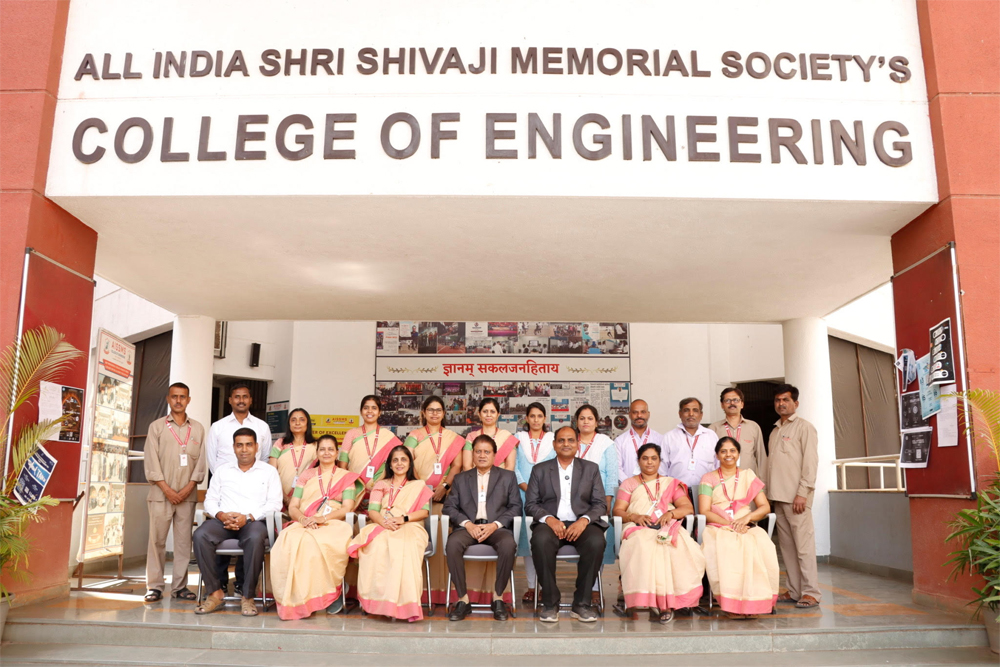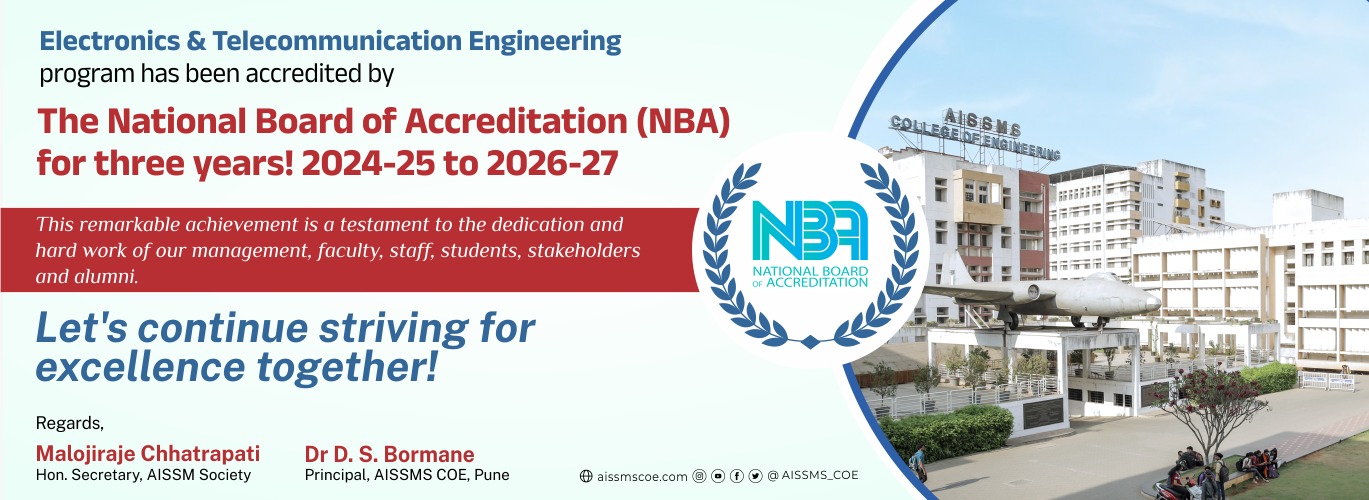The Department of Electronics and Telecommunication Engineering (formerly Electronics Engineering Department established in the year1992). The department has accredited by National Board of Accreditation (NBA) for three years 2024-25 to 2026-27 and offers two regular four-year B.E undergraduate program affiliated to Savitribai Phule Pune University.
| Undergraduate Program | Annual Intake |
| Electronics and Telecommunication Engineering | 60 |
| VLSI Design and Technology | 60 |
The Department presently has highly 14 qualified and experienced teaching staff on roll with 6 doctorates and 8 completed their ME degree. Faculty members of the department are not only engaged in cutting-edge technology research but are also very passionate about teaching. The faculty of the department are encouraged to upgrade their knowledge by attending courses, workshops, industry training and seminars. Students are also motivated to attend seminars and project competitions at state and national levels. Department has 9 well equipped laboratories. Besides teaching department conducts various activities for students for their overall development.
The department is having strong industry institute interaction and has signed 18 MOU’s with renowned industries. The department has a Center of Excellence in the field of Robotic Process Automation, fully sponsored by “Automation Anywhere”, headquartered in San Jose, California and also has a Center of Excellence in the field of AIML and Integrated IOT sponsored by AICTE under MODROB Scheme
To make students ready for industry requirements the department has started Honors degree programs from AY 2020-21 related to Robotics and Automation and Machine Learning, Data Science and Internet of Things.
The students are encouraged to participate in co-curricular and extracurricular activities like Drone and Robotics – National Level Competitions, National level conference, symposium, NSS etc. The department also conducts workshops, guest lectures, and Industrial visits to enhance the technical knowledge of students.
Mission:
- To facilitate E and TC graduates with sight of innovation.
- To provide stimulating learning environment with modern tools and technologies.
- To produce dynamic graduates with ethics and moral values.
- To impart quality education in the field of E and TC engineering to solve societal and industrialproblems
Vision:
- Society Growth and Welfare through Competent Electronics and Telecommunication Engineering Graduates
Program outcomes (PO):
PO1. Engineering knowledge: Apply the knowledge of mathematics, science, engineering fundamentals, and an engineering specialization to the solution of complex engineering problems.
PO2. Problem analysis: Identify, formulate, review research literature, and analyze complex engineering problems reaching substantiated conclusions using first principles of mathematics, natural sciences, and engineering sciences.
PO3. Design/development of solutions: Design solutions for complex engineering problems and design system components or processes that meet the specified needs with appropriate consideration for the public health and safety, and the cultural, societal, and environmental considerations.
PO4. Conduct investigations of complex problems: Use research-based knowledge and research methods including design of experiments, analysis and interpretation of data, and synthesis of the information to provide valid conclusions.
PO5. Modern tool usage: Create, select, and apply appropriate techniques, resources, and modern engineering and IT tools including prediction and modeling to complex engineering activities with an understanding of the limitations.
PO6. The engineer and society: Apply reasoning informed by the contextual knowledge to assess societal, health, safety, legal and cultural issues and the consequent responsibilities relevant to the professional engineering practice.
PO7. Environment and sustainability: Understand the impact of the professional engineering solutions in societal and environmental contexts, and demonstrate the knowledge of, and need for sustainable development.
PO8. Ethics: Apply ethical principles and commit to professional ethics and responsibilities and norms of the engineering practice.
PO9. Individual and team work: Function effectively as an individual, and as a member or leader in diverse teams, and in multidisciplinary settings.
PO10. Communication: Communicate effectively on complex engineering activities with the engineering community and with society at large, such as, being able to comprehend and write effective reports and design documentation, make effective presentations, and give and receive clear instructions.
PO11. Project management and finance: Demonstrate knowledge and understanding of the engineering and management principles and apply these to one’s own work, as a member and leader in a team, to manage projects and in multidisciplinary environments.
PO12. Life-long learning: Recognize the need for, and have the preparation and ability to engage in independent and life-long learning in the broadest context of technological change.
Program Specific Outcomes (PSO):
An E & TC engineering graduate will be able to:
- PSO1: Systems Development: Design and develop prototype or system using hardware and software skills for multi-disciplinary applications.
- PSO2: Adaptability: Demonstrate an ability to adapt emerging technologies in the field of Artificial Intelligence machine learning, Internet of things and Robotics to solve the real life problems.
- PSO3: Skill Development: Develop technical and management skills through student clubs and industry interactions.
Program Educational Objectives (PEO):
PEO1: To build strong fundamental knowledge among graduates required to pursue theirhigher education and continue professional development.
PEO2: To enable graduates to identify, analyze and solve Electronics Engineeringproblems by applying basic principles and modern techniques.
PEO3: To enable graduates to innovate, design and develop hardware & softwarecomponents and groom their ability to succeed in multidisciplinary and diverse field.
PEO4: To inculcate in graduates professional attitude, effective communicational skills, team work skills for becoming a responsible, cultured human being.

